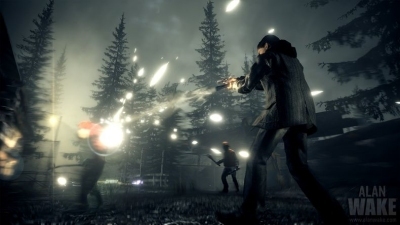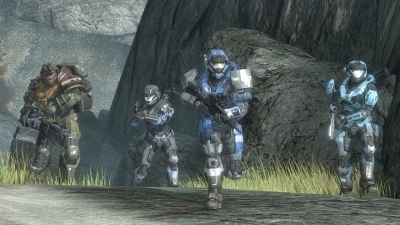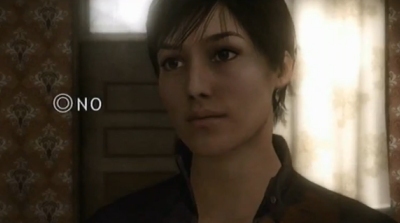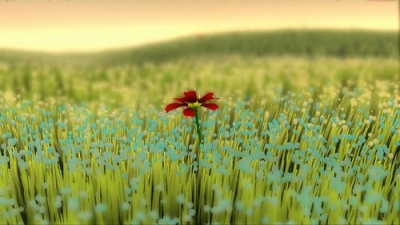 About GamePeople
About GamePeople
Subscribe to the Faithful Gamer column:![]() RSS or
RSS or
![]() Newsletter.
Newsletter.

Further reading:
Andy Robertson
Heavy Rain
Fable 2
Mass Effect
Flower
Buy/Support:
Support Andy, click to buy via us...





Do games offer a valuable resource to engage with dark taboo topics? I suggest that video games can provide a safe play-space in which we can explore our responses to potentially frightful and scary topics - abandonment, loss, death, abuse and war.
I want to start by looking at how games relate to more traditional forms of storytelling like books and films. In many ways videogame are pretty similar to more established media. Because they are new and impressive in terms of the technology they use, it's easy to treat them as something alien and very different, when in fact they are broadly trying to achieve things we've been doing for hundreds of years - which is to engage each other in meaningful stories.
Seen in this light it becomes obvious that, like other forms of literature, videogames need to be read. Most games have a narrative structure and proceed like a book. Players start at the beginning of the story and work their way through the experience to get to the end. How they travel through the space is very different, as we shall discuss, but the overarching aim is the same.
This is more apparent in some games than others. Games like Alan Wake on the 360 take the player through a story that is much like a Stephen King novel. The game is chaptered, and each chapter has particular checkpoints where the player pauses to metaphorically turn the page. Even games that are more action oriented, still wrap things up in a broad story.
The challenge for videogame is integrate the storytelling elements of the experience with the gameplay itself. Some games, like Halo for instance, will offer cut-scenes that tell the narrative in short bursts intersecting the shooting parts of the game. Others, like Uncharted 2 on the Playstation, try and move more seamlessly between action and narration by using the same graphical engine for both elements that makes the narration indistinguishable from the gameplay - visually at least.
But what games can't get away from is that the fact that their stories are built around their ability to offer the player choice. Rather than a passive observer, videogame players are involved in acting out different moments of the story the videogame is telling.
It's here, perhaps, where we find our unease at the topics some games address. The worry is that because the player is involved in the story, their acting out of things could have a detrimental effect on them, particularly if they are young and impressionable. We suspect it is a very different thing to play the part of a murderer than to just read or watch them in a book or film.
It's this active participation in a story that offers potential for deeper engagement for players.
But before we can really answer those concerns we need to understand how this aspect of gaming works. The ability to affect the unfolding story is a large part of what makes a videogame exciting and significant for players. It's this active participation in a story that offers potential for deeper engagement for players.
However, at the moment at least most games are totally open and direct the player down some sort of central channel for the story. Along the way this can have side quests that provide optional distractions, but largely the player is clearly directed towards an end point.
What they can do is let the player decide in what order the story unfolds, as well as offering multiple endings. Games like Heavy Rain on the Playstation, is an excellent examples of this with its multiple endings. As players make choices through the game different character and scenes are dynamically added or removed. By the time the story concludes, some ten hours later, the player has had a game tailored for them -different to anyone else's.
This sense of choice creates a very different experience to reading a linear novel.
Whereas the plot in a novel is preset and can't actively respond to the reader, videogames can react to player's choices and create alternate futures and unforeseen consequences. Games like Fable 2 and Mass Effect are interesting because they present the player with choices that often have far reaching consequence - something that's not entirely obvious at the time. These choices can affect not just the story line, but also the game world itself and the ability the player has to interact with characters within it.
This ability of games to engage the player as an actor, offer them a degree of choice and then turn that into tangible consequence and plot resolution starts to identify how game are different from other forms of storytelling. While books and films engage us with story, videogames engage us through agency. They are moving and meaningful because they genuinely involve us in their world.
The different explanations were left to stand on their own merits, and resulted in a fascinating interplay between different narratives.
From our description of gaming so far I think we can say that they have the tendency to be more obviously writerly (in that writers have more say of its meaning) than books or films. Because we are granted agency it is more apparent that we are interpreting the unfolding events for ourselves. We, as the player, are accommodated within the action of the story and granted permission to change things.
This is similar to other texts that don't have an obvious meaning. When we read poems and fairy tales for instance we feel free to interpret and project our own meanings onto them. When we read more traditional stories like the bible, we are less aware of the interpretation that is going on.
The best games at doing this are those that deliver a more open ended experience. Although games are often praised for being filmic, they are most effective when they grant the player licence to define what is happening rather than when they look like cinema. Flower on the PS3 for example invites players to guide a single flow petal through a windswept landscape. Progression involves exploring the fields, rocks and wildlife to discover other flowers and collect petals. But the game leaves the player to decide who the hero is and who the villain in the story is, and what is wrong with the world. It's a very open experience.
Last year at greenbelt I used this game in a session with the youth. We played the game together for a while and then spend some time talking about what the story was. We ended up with good six or seven different interpretations. The interesting thing was that no one was in a position to say which story was correct. The different explanations were left to stand on their own merits, and resulted in a fascinating interplay between different narratives.
Our engagement with the videogame was a very different conversation than we could have had in that group about the bible, and this was down to the openness of the game to grant us ownership.
Whereas books and films are obviously owned by their creators, videogames feel more collaborative. Although designed with a general end goal, the detail of the story and how we get there is owned much more by the players themselves.
There are some games that try to blur this distinction between creator and consumer further. They provide players with the tools to create their own games. In Little Big Planet for example, players can create their own stories from scratch. And in Halo 3 they are granted permission to invent and distribute their own levels.
In terms of a creative space, this kind of owned writerly story is unusual. It takes on more significance when you consider the possibility of games as somewhere that groups of people find meaningful experiences. This is perhaps why we have our concerns that playing a game is more dangerous than reading a book. Videogames get under our skin because they we own them.
When videogames, as they often do, gravitate towards more controversial subject matter the player is engage more intimately in that subject. But as well as the perceived danger, I want to suggest that there are also opportunities and reminders for us.
Firstly, I agree with Stanley Hauerwas who suggests in his essay on Watership Down, that a healthy community is one that keeps within it dark stories. Although it can seem scary or shocking, engaging with these topics is actually the safest thing to do.
The greater danger, potentially, is for us to stay silent on these subjects and not engage with them.
Where they are played appropriately, players are safe in the game space, they are able to experience the events without physical danger to themselves. The greater danger, potentially, is for us to stay silent on these subjects and not engage with them. If they ever arrive in our lives for real, we may find ourselves in a precarious position without resources, or reference points to help us cope.
Because of their openness, videogame also don't fall foul of totalising ideology. In this light you could consider it more dangerous for someone to be reading an ideology heavy book on a subject than experiencing it first hand in a game. The later invites the player's opinion and response in a loose playful way, while the former looks to dictate its truth to the reader.
Videogames enable us to engage playfully with dark stories in safe spaces. The perceived power of videogames to be dangerous experiences - because of our involvement in the action - is also an opportunity for meaningful engagement.
A video game experience results from our reactions and responses to the themes of the game, as much as what is dictated by the writer. When games involve taboo subjects or dark topics there is an opportunity to really engage ourselves. Here, we are not just learning about the mechanics of various atrocities but also how we react to them in a personal way.
In a society often silent about topics such as death, abandonment, betrayal and abuse, videogames offer a timely opportunity to address these fears and provide a fund of meaning to cope with them if we should encounter them in real life.
This is historically the work of the church, with the bible being the location for these essential dark stories that our communities own and decide to retain.
At a time when wider ownership of these dark areas of the bible seems to be diminishing in our culture, it's interesting that videogame seems to be plugging this gap. Rather than feeling threatened by them, perhaps they should serve as a reminder about the tried and tested resources we have to engage with these topics in the bible.
Games serve as a reminder of this porous nature of texts like the bible, that we don't read as outsiders, but get our hands dirty with because we are the community that own them.
This reminder results from games being writerly texts. They are a picture of what is actually going on, to some extent, under the surface whenever we read something. If a story is going to be meaningful for us we need to be able to own it. The stories we keep with us are those that we identify with, and that allow us to interpret their meaning.
Games serve as a reminder of this porous nature of texts like the bible, that we don't read as outsiders, but get our hands dirty with because we are the community that own them.
Videogames in this light can become part of our task of showing the world how to be an authentic place to live. As Stanley Hauerwas put it "showing the world how to be the world".
It's a space were we need to take care over, and guidance and parenting is obviously essential. But perhaps, asking individual ethical questions about whether a game is good or bad misses the point. I think we have a better chance of success by understanding, engaging and endorsing them for our families and communities.
Perhaps we need to be doing more work to connect people with game experiences that would be meaningful and enjoyable to them, rather than working to keep them away from those that we deem inappropriate.



Andy Robertson wrote this Faithful Gamer article under the watchful eye of Andy Robertson.
"Videogame reviews for the whole family, not just the kids. I dig out videogame experiences to intrigue and interest grownups and children. This is post-hardcore gaming where accessibility, emotion and storytelling are as important as realism, explosions and bravado."
© GamePeople 2006-13 | Contact | Huh?

|
Family Video Game Age Ratings | Home | About | Radio shows | Columnists | Competitions | Contact
With so many different perspectives it can be hard to know where to start - a little like walking into a crowded pub. Sorry about that. But so far we've not found a way to streamline our review output - there's basically too much of it. So, rather than dilute things for newcomers we have decided to live with the hubbub while helping new readers find the columnists they will enjoy. |
Our columnists each focus on a particular perspective and fall into one of the following types of gamers:
|